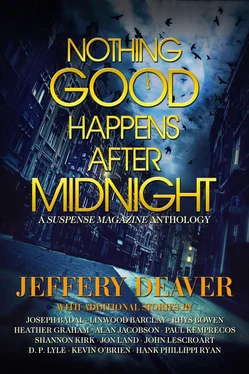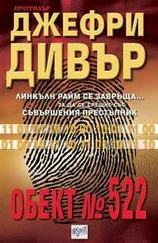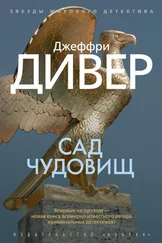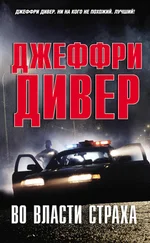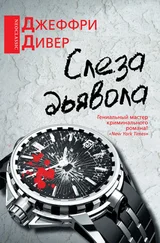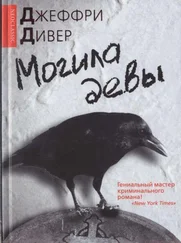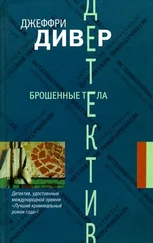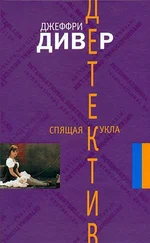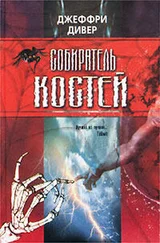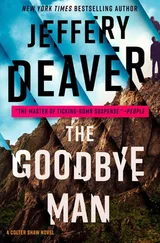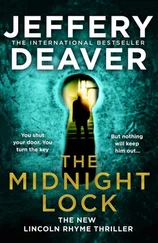“I think I will. Thanks.”
“How’s Joanne?” Beth asked.
Edward answered, “Broken arm. Concussion. She’s in the same prison hospital as Robert.”
As Joanne had lifted the knife, Beth had reached behind her and grabbed the fireplace poker. She’d struck her sister-in-law a half-dozen times, and the woman collapsed on the floor. She remained conscious — and humming eerily — but didn’t have the energy to rise and renew her attack.
“The physical stuff isn’t that bad. But she’s still in that weird state. Like sleepwalking.”
Beth said, “I figured out the knives, the pattern.”
“That he left on the kitchen island?”
“Right. Robert arranged them like they were notes on a musical staff. D-E-A-D.”
Edward shook his head.
“That two people flew into murderous rages after listening to the music? That’ll help the defense.” She looked over at her brother-in-law. “I’ll meet our lawyer tomorrow. I’m sure he can recommend somebody to represent Joanne. He can’t handle her case too. There’d be a conflict.”
“She did try to kill you, after all.”
“No, she didn’t. It was somebody — something — else.” Beth nodded at her computer. “I want to give the lawyers as much information as we can about the sonatina.”
She returned to the article she’d been reading — the account of the Boston concert attack in 1923.
The conductor of the chamber group, Sebastiano Matta, took strong umbrage at the suggestion that the piece of music they had played — everyone agreed, with consummate skill — was in any way responsible for the tragic event. “Music cannot cause any such mischief. We will not allow anyone to spread scandalous rumors about Señor Scavello’s marvelous sonatina. No one will ever stop us from performing the piece.”
Beth clicked forward and came to the last page.
A short scream shot from her mouth.
Edward spun and approached.
“No,” Beth whispered.
“What is it? Tell me.”
“They’re the same,” she whispered.
“Who?”
Beth was looking at a photograph of Matta, the conductor of the chamber group in Boston, where the murder had occurred in 1923. And beside him, the beautiful young violinist who’d performed the Midnight Sonatina that night.
They were identical to the conductor and principal violinist of the Salem Chamber Players from the concert yesterday evening.
Identical, right down to a scar on the conductor’s jaw and a streak of white in the young woman’s hair.
How could this be?
Then, with a shock, she remembered that she’d called the conductor, saying she was researching any odd incidents surrounding the sonatina. And given her name.
No one will ever stop us from performing the piece...
Just then Edward’s phone rang. He glanced at the screen — she could see it read No Caller ID — and hit answer, held the unit up to his ear. “Hello?”
He frowned and glanced at Beth. “Odd. Nobody’s there. Just some music.”
The chill shot through her body like an electrical jolt. She whispered: “Put it on speaker.”
He did, and a whirlwind of notes, like knives hissing through the air — the opening measures of the Midnight Sonatina — filled the trailer.
After Midnight
Cinderella Then and Now
Rhys Bowen
The palace clock was chiming midnight as she ran down the steps. Behind her she heard the prince calling, “Wait! Lovely maiden, please wait. Don’t go. I don’t even know your name.” But she did not turn back, she kept on running. One of the glass slippers fell off on the steps, making her almost trip and fall, but she wrenched off the other one and kept going, barefoot. Ahead of her she could see the sparkle of the glass coach, the white horses chomping and ready to gallop away with her. She was vaguely aware of guards standing at the bottom of the steps, hearing the prince’s voice, unsure whether to apprehend her or not. She brushed past them and climbed into the coach.
“Home, quickly,” she commanded.
The coachman cracked his whip, the horses neighed, and she was flung back in her seat as they took off. Countryside flashed past in a blur until suddenly there was a flash, a crackle, and she found herself sitting on the road. She was no longer wearing the shimmering dress, but her old rags. A large pumpkin lay beside her. Mice scurried around, looking for places to hide, and the goose who had been her coachman honked forlornly.
“Oh no,” she sighed. She was a long way from home. If her step-mother and sisters arrived home before her, she would be in awful trouble. “What do I do now, fairy godmother?” she called into the night.
There was no answer. Clearly the fairy godmother had done her one good deed and retreated into another realm. Cinderella was on her own, back in the harsh reality of a long walk through a dark forest. The mice scurried to her as she stood up. She scooped them up and tucked them into her pocket. She was not about to abandon them to be prey to forest beasts. Neither would she like to be prey herself, she thought.
“Fly home,” she said to the goose. “I can’t carry you and you’d be a tasty treat for a fox.”
The goose took a few ungainly steps, wings flapping until it became airborne and flew off into the night. “If only I could fly away home,” she thought, but then she realized that she had no place she could call home any longer. With a sigh she picked up the pumpkin and set off, wincing as her bare feet contacted the rocks in the unmade road.
She had not gone far when she heard the sound of hoofbeats behind her. She stepped off the track, blending into the darkness of the trees. Only brigands and robbers would be out at this time of night, she thought, unless it was a coach returning from the prince’s ball. And the occupants of a grand coach were hardly likely to give a ride to someone who looked like a beggar girl. The thought crossed her mind that it might be her step-mother’s coach. Could she think up a plausible reason to stop it and ask for a ride home? She tried to think of one, but lying did not come easily to her. If Step-mother arrived home first she would think that Cinderella had shirked her duties and gone to bed, and she would lock the big front door.
“I could say that I wanted to catch a glimpse of the ball gowns,” she thought out loud. “She’d scold me and call me stupid, but surely she’d give me a ride home, or I might be too tired to make her breakfast in the morning.”
The galloping hooves drew nearer. The shapes of horsemen loomed up. Not a coach in sight. She stood very still among the bushes as they passed. Suddenly one of them gave a shout. They wheeled around and were facing her.
“You, girl!” one of them shouted. “Have you seen a coach pass this way? A glass coach?”
“No, sir,” Cinderella said. “No coach has passed this way since I’ve been on the road.”
The lead horseman came closer. One of his fellows held a flaming torch above Cinderella’s head.
“And what are you doing out in the forest alone, at this time of night? I’d like to know.”
“I had to go to my relatives’ house to fetch this pumpkin,” she replied. “I had to pass the castle and I heard the music coming from the ball. I’m afraid I lingered too long, hoping to catch a glimpse of the beautiful dresses. Now I’ll be in trouble if I’m not home soon.”
“Where do you live?”
“At the tall white house on the far edge of the forest.”
“You’re a servant there?”
She hesitated and swallowed hard before saying, “Yes, I’m a servant.”
“So you say no coach has come this way?”
“On my honor, sir, no coach has passed me.”
Читать дальше
